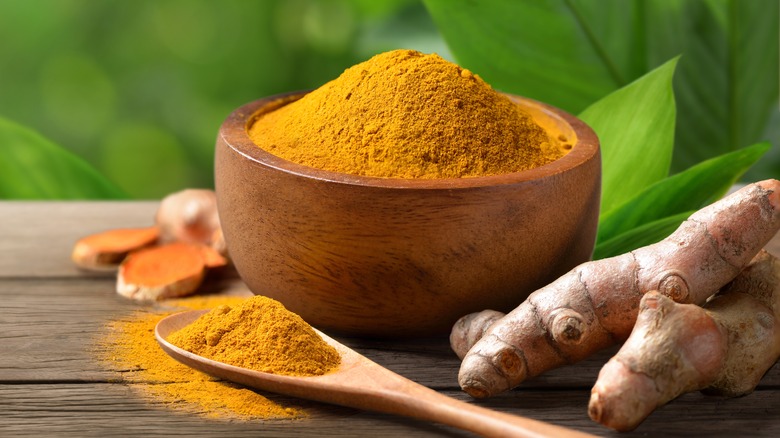If You Eat This Popular Spice, Your Early Death Risk May Decrease
Spices give many of your favorite foods that little extra kick. Mozzarella comes to life when you add a little basil, and pico de gallo is nothing without cilantro and jalapeno. Your favorite fall latte isn't the same without that pumpkin spice blend.
Some of your favorite herbs and spices also have medicinal properties. A compound in cinnamon can control your diabetes and reduce inflammation. Adding some ginger to your tea can soothe a queasy stomach. Garlic might be bad for your breath, but it's great for your cardiovascular health.
Turmeric flavors some of your favorite Indian curries, but turmeric's polyphenol curcumin has serious antioxidant and inflammatory power. Ayurvedic and Chinese medicine have been using turmeric for centuries to improve digestion, relieve gas, and soothe arthritis pain (per the National Institutes of Health). According to a 2019 study in the Journal of the American Heart Association, adding turmeric to your daily meals can reduce your early death risk by 10% and your cardiovascular death risk by 9%.
Turmeric's benefits for longevity
As you age, your cells reduce their capacity to regenerate, and eventually the cells die. This is linked to the telomeres that cap the ends of your chromosomes and protect them from damage, according to a 2021 article in Biomedicine and Pharmacology. When cells divide, the telomeres shorten over time. Oxidative stress can speed up the rate of telomere shortening. Your diet can affect the shortening of the telomeres, and a healthy diet and exercise can slow the rate of cellular death and lengthen your lifespan.
Polyphenolic compounds like curcumin in turmeric protect your cells by reducing the oxidative stress associated with cellular aging. Curcumin has been shown to help with cardiovascular, neurological, and metabolic health, and it has 10 times the antioxidant power of vitamin E. It also sustains the Nrf2 protein, which activates your antioxidant enzymes. Cancer cells can also be suppressed when treated with curcumin.
Your immune system also weakens as you get older, so you're more prone to infections and inflammation. The curcumin in turmeric can reduce inflammation and protect you against diseases like diabetes, osteoporosis, and Alzheimer's.
Adding turmeric to your diet
But before you add a bottle of turmeric extract to your shopping cart, a clinical dietitian at Johns Hopkins Medicine says high concentrations of turmeric can raise your risk of kidney stones. On their own, the compounds in turmeric aren't as bioavailable to the body, so your body quickly processes and eliminates them before they can be absorbed. If you use turmeric to spice up your meals, add some black pepper to increase your body's absorption of turmeric. You can also chop some turmeric root and add hot water for a turmeric tea, or try a colorful turmeric latte.
A 2019 article in Food and Function found that 400 milligrams of turmeric root or turmeric powder added to mashed potatoes and cream were better absorbed by the body than the curcumin powder alone. This shows that even though curcumin is the potent antioxidant in turmeric, it's best to consume turmeric powder or turmeric root to make it more bioavailable. Although turmeric is relatively safe, people who are pregnant might want to avoid it above what's found in recipes such as curry.


